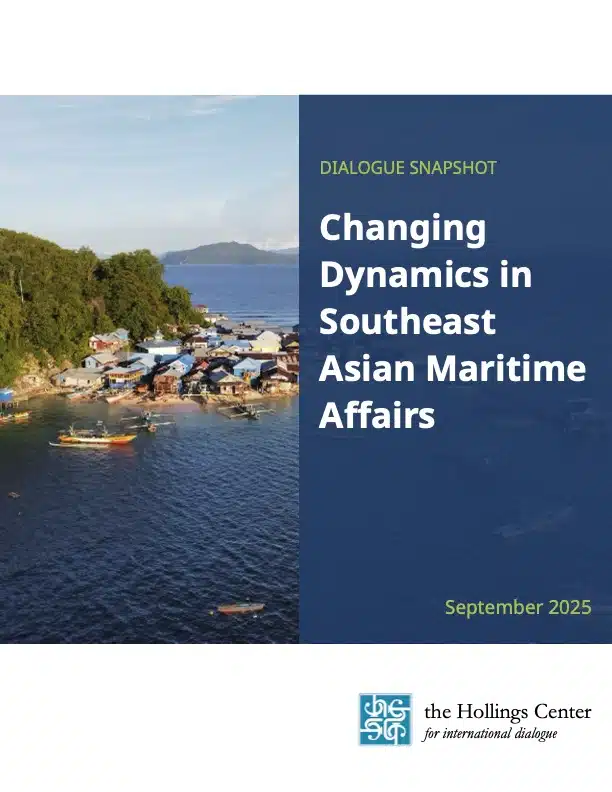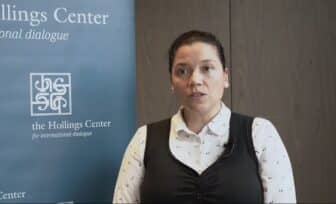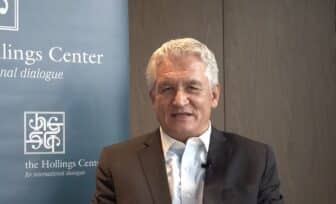DIALOGUE SNAPSHOT REPORT
September 2025
Kuala Lumpur, Malaysia
Dialogue Summary
The Changing Dynamics in Southeast Asian Maritime Affairs Dialogue brought together regional and international experts to assess the evolving security landscape in Southeast Asia’s waters. Participants examined the interplay between law, politics, and non-traditional security threats, highlighting how fragmented governance and diverging national priorities complicate cooperation. Malaysia, Indonesia, and the Philippines were cited as cases where differing priorities—ranging from refugee flows to piracy—shape national approaches to maritime security.
Discussions underscored the challenges of legal implementation. International frameworks exist to provide global standards Frameworks, but enforcement in Southeast Asia remains uneven. Legal gaps, especially around piracy and trafficking, leave space for criminal networks to thrive. Participants also noted that international frameworks can both empower states, as with fixed baselines to preserve sovereignty, and constrain them, as in the Philippines’ difficulty prosecuting piracy in its exclusive economic zone.
Non-traditional threats featured heavily in the dialogue. Illegal, unreported, and unregulated fishing links directly to trafficking, forced labor, and transnational crime. Participants described how vessels are used for smuggling people, narcotics, and weapons, while “dark shipping” further undermines monitoring efforts. The rise of cyber intrusions and vulnerabilities in undersea digital infrastructure added another layer to the risks facing Southeast Asia maritime affairs.
The dialogue concluded with practical recommendations. These included strengthening ASEAN’s capacity to coordinate through mechanisms like the ASEAN Coast Guard Forum and AHA Centre, investing in social protection to address migration drivers, and developing national maritime strategies to improve inter-agency coherence. Participants also urged regional governments to treat cyber and digital infrastructure as core security concerns, not peripheral issues. The overall message was clear: Southeast Asia’s maritime future will depend on inclusive, anticipatory, and cooperative approaches that reflect both regional realities and global trends.
Key Takeaways of the Gulf and Central Asia Dialogue
Strengthen ASEAN platforms: Participants urged expansion of the ASEAN Coast Guard Forum and encouraged adapting the AHA Centre to address not only disasters but also protracted refugee and migration crises.
Harmonize laws: They recommended aligning national laws with international standards and conventions, while clarifying definitions of piracy, trafficking, and illegal, unreported, and unregulated fishing (IUU) to close enforcement gaps.
Integrate cyber into governance: Participants called for adding cyber threats and submarine cable security to ASEAN agreements, including the South China Sea Code of Conduct, and for building closer collaboration with industry and academia.
Invest in root causes: They suggested directing resources toward development in source and transit countries, such as Bangladesh and Myanmar, and easing overly restrictive migration regulations to reduce reliance on smugglers.
Improve national coordination: Speakers proposed drafting national white papers on maritime security to align ministries, break down agency silos, and strengthen political will.
Broaden participation: They recommended including technical experts, private sector actors, and even directly affected groups—such as refugees—in future dialogues and policymaking processes.
Build resilience: Participants emphasized expanding training programs, maritime domain awareness initiatives, and funding mechanisms to move from reactive to anticipatory governance.



